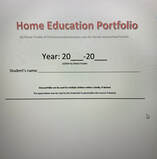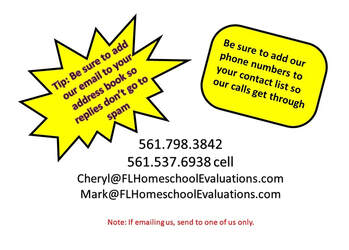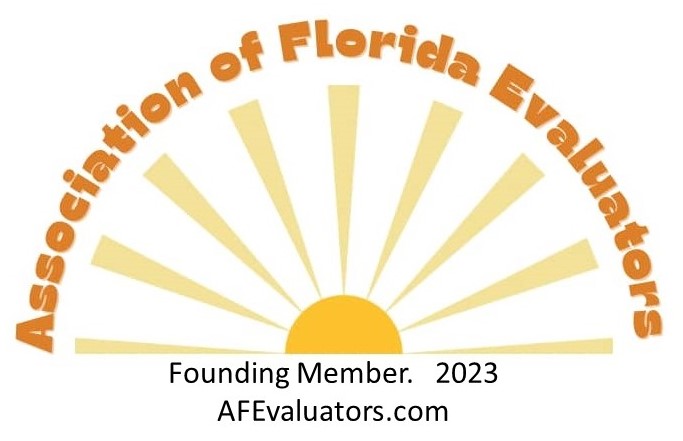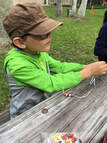|
Homeschooling Children with Special Needs in Florida
Are there additional requirements to homeschool a child with special needs?
No. The same requirements apply to all students. There are no additional forms to fill out--though you might want to apply for the Family Empowerment Scholarship: Unique Abilities Scholarship to possibly get extra funds to help pay for special therapies, curriculum, etc.
If the child doesn't have an IEP, that may help get additional funding for the student through the scholarship. Do I need to mention the special needs on the Letter of Intent?
No, the Letter of Intent must include the child's full name, date of birth, address, a parent's name and signature, and state that the parent intends to take control of the child's education following Florida's home education laws. No other information is required on the Letter of Intent.
How do we request accommodations on the evaluation?
If using public school testing as the evaluation, the parent would contact the school's (or district's) Testing Coordinator; contacting the ESE Dept. as well may be helpful.
If doing private testing, ask the person administering the test about options. For the portfolio review evaluation, the type of evaluation we offer, no special accommodations are required in most cases since the evaluation looks for educational progress commensurate with ability--the child's work or materials at the beginning of the year are compared with those at the end; if the child's been learning and records have been kept, the evaluation is passed. If the child is nonverbal and cannot participate in the brief follow-up discussion at all, then providing documentation of a diagnosis or prior IEP can be helpful. Message us with details for assistance. We've done homeschool evaluations for special needs students since 2003. Do you do assessments to determine if a child has special needs?
We provide Florida homeschool evaluations to meet Florida home education law requirements.
If you need an assessment to determine if a child has special needs, including learning disabilities or giftedness, you'll need to contact a psychologist or educational psychologist or similar professional. Which homeschool evaluation method is best for a child with special needs?
Many parents find that the portfolio review evaluation works best for children with learning disabilities or other special needs (though this type of homeschool evaluation works well for all children).
The portfolio review evaluation is not a test and enables the evaluator to view materials from the beginning of the year and then more recent materials to help find evidence of educational progress commensurate with ability. It is low-stress and works for children of all ability levels. Contact us if you need more details. Special Needs Students with special needs are those who learn at a different pace or need more support than typical; students may have different abilities--including physical and/or learning disabilities and/or giftedness. Exceptional Student Education (ESE): The official name in Florida for education programs for children with special needs. Most modern schools are set up like factories and expect all children to work on the same schedule and learn in the same way. While some exceptions to this are made in Special Education departments in schools, homeschooling can often be a better fit as homeschooling is totally customizable for the individual student's needs. Q: How do homeschool evaluations work for children with special needs?
-- A: Florida law gives parents five options to choose from for evaluations. These are the same for students with special needs as they are for other students. Three options are testing options. 1. Public School Testing
State-mandated testing--accommodations must be made if a child has an IEP in place. Scores above the 35th percentile are considered passing per the Craig Dickinson Act. Scores are automatically used as the evaluation if testing is done
2. Nationally-normed achievement testing administered by a certified teacher
Parents may choose the test and level and the administrator; the test protocols should allow for accommodations but may have rules in place about those. Scores above the 35th percentile are considered passing per the Craig Dickinson Act.
3. Testing with a psychologist or school psychologist
If the student is being tested for learning disabilities or giftedness, consider using the testing as the evaluation. The type of testing is up to the psychologist. The legal standard for passing is not clear here but could be the same as the annual evaluation--evidence of educational progress commensurate with ability.
Option 4 is a portfolio review evaluation. This is the type of evaluation we offer and is perfectly suited to any student since "evidence of educational progress commensurate with ability" is the legal standard for passing. This type of evaluation involves showing records of the child's education and as long as the student is regularly being educated at a level that works for the student and the parent is keeping records, passing this type of evaluation should not be a worry. We are very special needs-friendly and have done evaluations for many children with special needs including those who are severely behind their peers and nonverbal. Option 5 is any other type of evaluation the parent and district agree on. Feel free to suggest other possibilities such as therapists' or doctors' reports, grades from curricula, etc. and see if the district will agree. 2E
Children who are 2E, or twice exceptional, have both exceptional ability and disability; they are gifted and challenged at the same time. Some useful websites
Learning Abled Kids: A site full of information related to special needs and also homeschooling
The Ultimate Guide to Gifted Children: LOTS of information about gifted children, homeschooling them, support, and more
Gifted Homeschoolers Forum Press: A publisher focused on homeschooling gifted children |
Q: Do homeschooled children need an IEP (Individualized Education Plan)?
--- A: Not necessarily. In a school, such a plan is meant to help a child be treated in a way that will help make the child more successful. But at home, homeschooling can be totally customized. When learning at home, children can take breaks to walk around, work off energy, get a snack, go to the bathroom, move on to another topic, etc. whenever needed without permission from a bureaucratic organization. Methods and materials can be used that are best for the specific child--if something isn't working, the parent can dump it and try something else without having to get approval from anyone. The child can take as much time as needed. And so on. On the other hand, an IEP might help with getting resources needed (such as qualifying for certain scholarships--see information on this page about the Family Empowerment Scholarship) whether now or in the future. Curriculum Options
Feel free to use any curriculum or methods appropriate for your child. You may use materials below (or above) grade level, if appropriate. Or ones with no grade level at all. Some options that many have found useful include:
Orton-Gillingham Method Materials
This method of teaching reading has worked well with students with dyslexia and other struggles with learning to read. Examples of curricula using this method include The Logic of English, All About Reading, All About Spelling, and more. For more information on the options and choosing for your child, see learningabledkids.com/reading/proven_reading_programs.htm
MBTP is curriculum written for homeschoolers by several including an expert in special needs education.
www.movingbeyondthepage.com/ Lists of curricula, supplements, and other resources for children with special needs; list indicates which are secular and which are faith-based
a2zhomeschooling.com/special-needs/ The Florida Department of Education's policies, as listed on their Home Education FAQ, discuss Exceptional Student Education in questions 33-35. Florida law requires public schools to identify, locate, and evaluate students for special needs at no cost to the parent. Contact the ESE Administrator in your school district for more information. (Sometimes contacting the local public school's ESE Dept. may be faster.) The district MAY provide services. Section 1002.41(1) provides a mechanism for funding. --- Sometimes health insurance will cover services if parents use private providers. |
Family
|
The Trzasko Family
Cheryl & Mark Trzasko
(pronounced Trahs-koh) have homeschooled their own from the start. Two have graduated high school as homeschoolers with college credit earned already. One is now a teacher, and the other will soon finish serving our country. Our youngest are still learning at home. Cheryl was homeschooled for part of her early education. We are passionate about helping others homeschool and protecting their rights. Discover us on social media!We offer a free support group on Facebook for those who want more information.(This is not for advertising.) Answer the questions fully to join. (c) 2024
No. We do NOT want unsolicited website help. |
|







